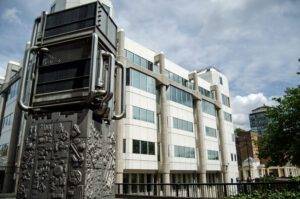
The commercial property market may be approaching its nadir as more workers return to the office, according to Land Securities, one of the UK’s largest landlords.
Mark Allan, CEO of Land Securities, which owns a portfolio worth billions, stated that the values of high-quality properties have “largely bottomed out and will start to grow in the foreseeable future as rents rise.” He noted that the reset of values over the past two years, driven by rising interest rates, has stabilised, with evidence of continued rental growth attracting increased investor interest in the best assets.
Allan’s comments came as the company reported an 18 per cent increase in the number of workers entering its office buildings. The return to office work, combined with employers planning to provide more space per employee, is driving “particularly strong demand for best-located, highly sustainable, and well-amenitised office space.”
Devaluations of Landsec’s office properties in London accounted for £449 million of its total £625 million portfolio writedown last year, bringing its portfolio’s value to £9.96 billion. Central London offices and office developments make up about 60 per cent of Landsec’s portfolio, with another 20 per cent comprising shopping centres and retail outlets.
These devaluations contributed to a pre-tax loss of £341 million for the 12 months ending in March, a narrower loss compared to the £622 million loss from the previous year, thanks to rising rents and stable values in the second half. The company’s net asset value per share fell from 936p to 859p, but it still increased its total dividend by 2.6 per cent to 39.6p per share.
Landsec, which owns notable properties such as the Bluewater shopping centre in Kent and the Dominion Theatre in London’s West End, is progressing towards its goal of selling £4 billion of “non-core” property. Recently, it sold its remaining hotel portfolio to Los Angeles-based Ares Management for £400 million, and it plans to sell approximately £400 million of retail parks and a small number of standalone London assets not located in its core areas. In the longer term, Landsec aims to dispose of its “sub-scale” out-of-town leisure parks.
Proceeds from these disposals have provided Landsec with about £1 billion to invest in its committed development pipeline and other properties over the next 12 months. The company’s other top priority is investing in prime retail, driven by confidence in the performance of its existing retail locations, where it sees “really attractive” returns.
Read more:
Commercial Property Values Poised for Growth as Office Return Accelerates





